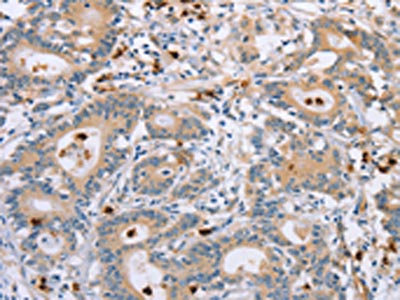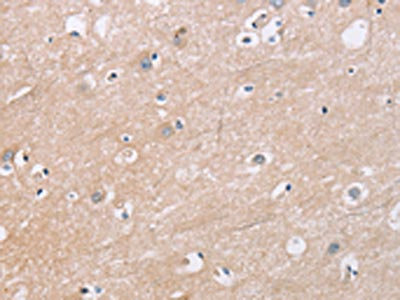KLK4 Antibody
-
货号:CSB-PA214768
-
规格:¥1100
-
图片:
-
The image on the left is immunohistochemistry of paraffin-embedded Human colon cancer tissue using CSB-PA214768(KLK4 Antibody) at dilution 1/40, on the right is treated with fusion protein. (Original magnification: ×200)
-
The image on the left is immunohistochemistry of paraffin-embedded Human brain tissue using CSB-PA214768(KLK4 Antibody) at dilution 1/40, on the right is treated with fusion protein. (Original magnification: ×200)
-
-
其他:
产品详情
-
Uniprot No.:Q9Y5K2
-
基因名:KLK4
-
别名:7S nerve growth factor alpha chain antibody; AI2A1 antibody; Alpha-NGF antibody; Androgen-regulated message 1 antibody; ARM1 antibody; EC 3.4.21.- antibody; EMSP 1 antibody; EMSP antibody; EMSP1 antibody; Enamel Matrix Serine Protease 1 antibody; Enamel matrix serine proteinase 1 antibody; HK4 antibody; Kallikrein 1-related peptidase-like b4 antibody; Kallikrein 4 (prostase, enamel matrix, prostate) antibody; Kallikrein 4 antibody; Kallikrein antibody; Kallikrein L1 antibody; Kallikrein like protein 1 antibody; Kallikrein related-peptidase 4 (prostase, enamel matrix, prostate) antibody; Kallikrein-4 antibody; Kallikrein-like protein 1 antibody; Kallikrein-related peptidase 4 antibody; KLK 4 antibody; KLK L1 antibody; KLK-L1 antibody; KLK4 antibody; KLK4_HUMAN antibody; MGC116827 antibody; MGC116828 antibody; Prostase antibody; Protease Serine 17 antibody; PRSS 17 antibody; PRSS17 antibody; PSTS antibody; Serine protease 17 antibody
-
宿主:Rabbit
-
反应种属:Human
-
免疫原:Fusion protein of Human KLK4
-
免疫原种属:Homo sapiens (Human)
-
标记方式:Non-conjugated
-
抗体亚型:IgG
-
纯化方式:Antigen affinity purification
-
浓度:It differs from different batches. Please contact us to confirm it.
-
保存缓冲液:-20°C, pH7.4 PBS, 0.05% NaN3, 40% Glycerol
-
产品提供形式:Liquid
-
应用范围:ELISA,IHC
-
推荐稀释比:
Application Recommended Dilution ELISA 1:2000-1:5000 IHC 1:25-1:100 -
Protocols:
-
储存条件:Upon receipt, store at -20°C or -80°C. Avoid repeated freeze.
-
货期:Basically, we can dispatch the products out in 1-3 working days after receiving your orders. Delivery time maybe differs from different purchasing way or location, please kindly consult your local distributors for specific delivery time.
相关产品
靶点详情
-
功能:Has a major role in enamel formation. Required during the maturation stage of tooth development for clearance of enamel proteins and normal structural patterning of the crystalline matrix.
-
基因功能参考文献:
- During the descriptive analysis, the variables ethnicity, biofilm, and gingivitis and the markers rs2242670 and rs2978642 were statistically significant. In the multivariate analysis, the marker rs2242670 and the variable biofilm maintained statistical significance. Genetic variations in the KLK4 gene may contribute to dental decay. PMID: 28445870
- Epithelial-derived KLK4 promotes tumour progression by actively promoting cancer-associated fibroblasts differentiation in the prostate stromal microenvironment. PMID: 28510269
- structural analysis of mechanism of KLK4 inhibition PMID: 27767076
- These findings prompt a new mechanistic model and line of enquiry into the role of KLK4 in enamel hardening and malformation. PMID: 29229389
- Results show that AMTN and KLK4 are not essential for biological processes outside of the dentition or during the secretory stage of amelogenesis. Both KLK4 and AMTN proved to be essential for the maturation of dental enamel, a process that requires the removal of extracellularmatrix proteins and the deposition of ions on the sides of enamel crystallites. PMID: 26620968
- The KLK4 protein is localized in the cytoplasm of tumor and stroma cells. PMID: 28755528
- KLK4 as a potential multifunctional regulator of prostate cancer progression. PMID: 27378148
- Low KLK4 expression is associated with lupus nephritis. PMID: 26546590
- KLK4 may contribute to the metastasis of OSCC through the PI3 K/AKT signaling pathway PMID: 28743213
- KLK4 acts as an oncogene in OSCC cells, and targeting KLK4 may be a promising method for OSCC therapy. PMID: 28150891
- Studied a 70-kb region surrounding KLK4 in East Asian population; found within combined unusual low levels of diversity, high frequency variants with significant levels of population differentiation. PMID: 26420451
- secreted into the extracellular microenvironment by neutrophils stimulated with bioactive mediators PMID: 25563717
- Novel homozygous mutations in the KLK4 (c.620_621delCT, p.Ser207Trpfs*38) were identified in amelogenesis imperfecta consanguinity. Mutant KLK4 was degraded intracellularly and became inactive. PMID: 26124219
- this study provides supportive evidence in favor of a prognostic value for KLK4 in OSCC and suggests that KLK4 could serve as a potential therapeutic target in patients with oral cancer. PMID: 25862839
- Human ephrin-B2 is poorly cleaved by KLK4 while the homologous mouse is not. PMID: 25724897
- miR-378 was predicted to target both KLK2 and KLK4 and downregulated levels detected in prostate cancer patients. PMID: 25153390
- The differential regulation of alternative transcripts (using KLK2, KLK3 and KLK4 as models) by androgens and anti-androgens as an indicator of prostate cancers, was investigated. PMID: 25153393
- KLK4 mRNA positivity could be regarded as a novel independent indicator of favorable prognosis for the disease-free survival of laryngeal squamous cell carcinoma patients. PMID: 24854539
- The variant rs1722561 of Kallikreins might reduce the risk of sporadic intracranial aneurysms among individuals of Chinese Han ethnicity. PMID: 24405067
- These results demonstrate that the activities of AR and mTOR pathways are maintained by KLK4, which may thus be a viable target for therapy PMID: 23798432
- Survival analysis demonstrated that KLK4 mRNA expression constitutes an unfavorable prognostic biomarker in colorectal adenocarcinoma, predicting poor disease-free survival (DFS), independently of the nodal status and tumor size. PMID: 23201139
- amelogenesis imperfecta-causing mutations were identified in three of the probands: 1) a novel single-nucleotide deletion in both KLK4 alleles (g.6930delG; c.245delG; p.Gly82Alafs*87) that shifted the reading frame. PMID: 23355523
- findings provide suggestive evidence of a role for genetic variation in the KLK4 locus in prostate cancer predisposition PMID: 22970239
- signal peptide induces cytotoxic T cell responses in healthy donors and prostate cancer patients PMID: 21874303
- Complex gene expression at the KLK4 locus that might be a hallmark of cis sense-antisense chimeric transcription in prostate cancer cells. PMID: 20406994
- KLK4 is upregulated in early-stage but not late-stage prostate cancer. PMID: 20180634
- KLK4 signaling via PAR1 may represent a novel pathway in colon tumorigenesis. PMID: 20056842
- Kallikrein 4 overexpression is associated with endometrial carcinoma. PMID: 20009893
- Prostate cancer cells exhibit a novel double-paracrine mechanism whereby cancer epithelium produces KLK4 to activate PAR-1 in the surrounding stroma, in-turn releasing cytokines that stimulate cancer cells to proliferate & increase production of KLKs. PMID: 19795418
- The demonstration that KLK4-specific CD4 T cells exist in the peripheral circulation of normal male donors supports the use of KLK4 in whole gene-, protein-, or peptide-based vaccine strategies against prostate cancer. PMID: 12077288
- KLK4 has a unique structure and function compared with other members of the KLK family and may have a role in the biology and characterization of prostate cancer. PMID: 15059887
- A novel human kallikrein mutation associated with a rare autosomal recessive form of amelogenesis imperfecta. PMID: 15235027
- Human kallikrein 4, in particular, and prostate specific antigen, have a functional role in the progression of prostate cancer through their promotion of tumour cell migration. PMID: 16172196
- There are two major isoforms of hK4 (KLK4-254/hK4-254 and KLK4-205/hK4-205) expressed in prostate cancer with different regulatory and expression profiles that imply both secreted and novel nuclear roles. PMID: 16322328
- Here we demonstrate uPAR is a target for tissue kallikrein 4[hK4], cleaved in the D1-D2 linker and D3 domain. hK4 may modulate tumor-associated uPA/uPAR activity by activating the pro-enzyme form of uPA or cleaving the cell surface-associated uPA receptor PMID: 16497155
- Design of serpin fragments as highly specific inhibitors of human kallikrein 14. PMID: 16704423
- an investigation of its enzymatic properties regarding substrate preference, degradation of extracellular matrix proteins, and its inhibition by various inhibitors PMID: 16800736
- hK4 expression and interaction with both tumor cells and osteoblasts suggests a role for hK4 in prostate cancer bone metastasis PMID: 17221837
- KLK4 protein is significantly overexpressed in malignant prostate compared with normal prostate. KLK4 expression is predominantly in the nucleus of basal cells in the prostate epithelium in keeping with its distribution in prostate cancer cells in vitro. PMID: 17545602
- KLK4 and KLK5 activate pro-HGFA. PMID: 18221492
- These data provide insight into KLK4-mediated cell signaling and suggest that signals induced by this enzyme via protease-activated receptors may be important in prostate cancer. PMID: 18308730
- Recombinant hK4 activates ERK1/2 signaling of prostate cancer cell lines, which express both PAR1 and PAR2. PMID: 18567807
- KLK4 may be associated with the development and progression of breast cancer and suggest its potential use in breast cancer monitoring. PMID: 18687310
- KLK4 gene expression may be used as a new potential biomarker in breast cancer. PMID: 19190825
- In a family with a hypomaturation-type enamel defect, mutational and haplotype analyses revealed no mutations in the KLK4 gene. PMID: 19966041
显示更多
收起更多
-
相关疾病:Amelogenesis imperfecta, hypomaturation type, 2A1 (AI2A1)
-
亚细胞定位:Secreted.
-
蛋白家族:Peptidase S1 family, Kallikrein subfamily
-
组织特异性:Expressed in prostate.
-
数据库链接:
HGNC: 6365
OMIM: 204700
KEGG: hsa:9622
STRING: 9606.ENSP00000326159
UniGene: Hs.218366
Most popular with customers
-
-
YWHAB Recombinant Monoclonal Antibody
Applications: ELISA, WB, IF, FC
Species Reactivity: Human, Mouse, Rat
-
Phospho-YAP1 (S127) Recombinant Monoclonal Antibody
Applications: ELISA, WB, IHC
Species Reactivity: Human
-
-
-
-
-






















